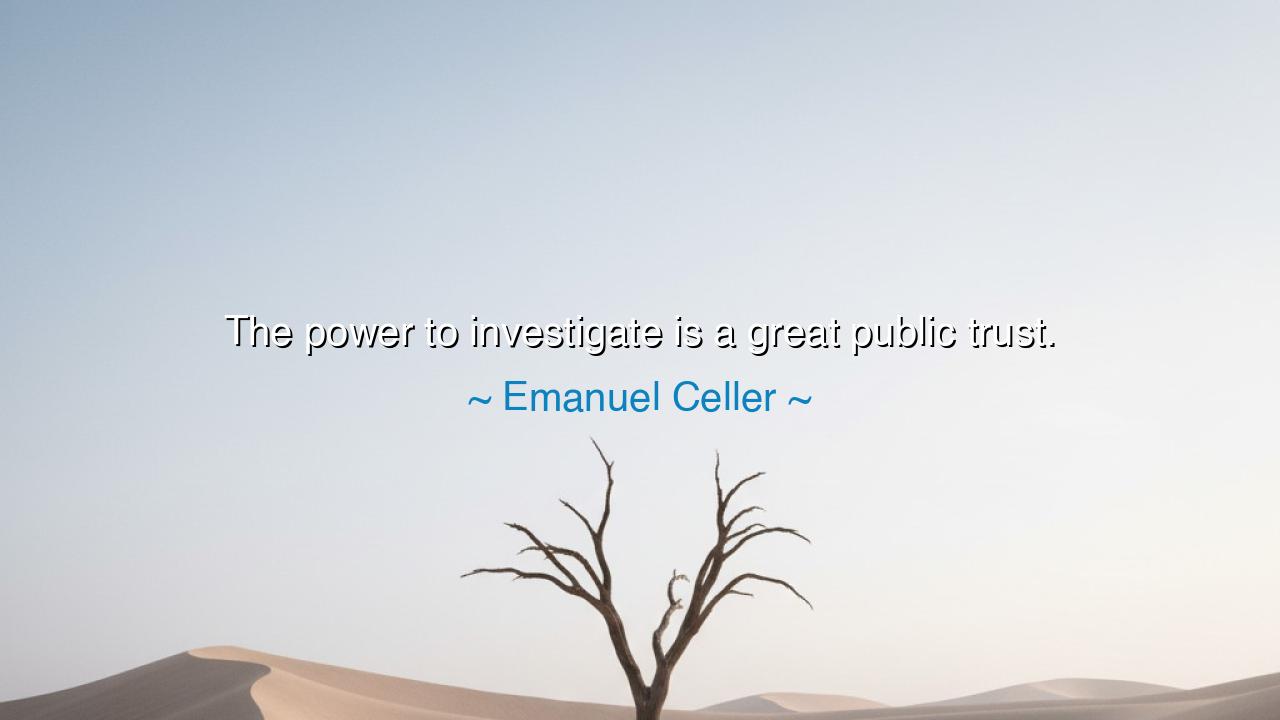
The power to investigate is a great public trust.






“The power to investigate is a great public trust.” With these words, Emanuel Celler, a statesman of the American republic, uttered a truth as old as the councils of the ancients. For whenever a people grant their servants the authority to inquire into secrets, to uncover hidden deeds, and to bring truth into the open, they give not a small gift, but one of the holiest trusts of governance. It is not a weapon to be wielded recklessly, nor a treasure to be hoarded for gain, but a sacred duty. For in the act of investigation lies the balance between liberty and tyranny, between justice and corruption, between the light of truth and the darkness of deceit.
The ancients knew this. In the forums of Rome, in the assemblies of Athens, the people appointed magistrates and guardians not to rule as masters, but to watch, to inquire, to ensure that power did not consume itself in greed. The public trust of investigation was a shield for the weak, a mirror for the powerful, and a beacon for all. When it was honored, nations flourished; when it was corrupted, they fell into ruin. For the hand that holds the lamp of inquiry must never forget that it burns for the people, not for personal ambition.
Consider the story of the Watergate investigation in the modern age. When shadows fell across the White House, and whispers of unlawful deeds grew into thunder, it was not armies nor kings that preserved the republic—it was the slow, careful, unyielding labor of investigation. Men and women, entrusted by the public, peeled away the veil of deception until the truth was laid bare. Though mighty voices cried out for silence, though power sought to shield itself, the investigators remembered their duty as a public trust, and the people were delivered from the snare of corruption. This story is a monument to the sacred responsibility that Emanuel Celler declared.
But take heed, for the same gift can be twisted. If the power to investigate is abused—wielded as a tool of vengeance, or as a means to oppress the innocent—then the sacred trust is shattered. Investigation without integrity becomes persecution; inquiry without justice becomes tyranny. The lamp that once illuminated truth becomes a torch that burns the innocent. Therefore, those who are given this power must walk with humility, vigilance, and unwavering loyalty to truth.
The lesson, then, is clear: whenever one is entrusted with the authority to seek truth on behalf of others, one must remember that it is not for oneself alone. It is for the people, for the community, for the greater good. This applies not only to judges, lawmakers, or investigators of government, but to all who find themselves in positions of discernment—teachers who judge their students’ work, leaders who inquire into the actions of their followers, even friends who hold one another accountable. In all these cases, the public trust demands fairness, patience, and reverence for truth.
Practical wisdom flows from this teaching: if you are ever given authority to investigate, temper your judgment with mercy; seek facts before opinion; honor transparency over secrecy. Protect the innocent as fiercely as you pursue the guilty. Keep your heart pure, that your hand may not be heavy with malice. And above all, remember that the truth you uncover belongs not to you, but to those you serve.
So let these words of Emanuel Celler echo across time: “The power to investigate is a great public trust.” Guard it as you would guard fire: use it to warm and protect, never to scorch and destroy. For when the guardians of truth honor their sacred duty, the people dwell in safety, justice reigns, and the republic endures. But when that trust is betrayed, the pillars of freedom tremble, and darkness spreads. Therefore, O children of the future, if ever you bear the lamp of inquiry, let it shine only for truth, for justice, and for the people.






AAdministratorAdministrator
Welcome, honored guests. Please leave a comment, we will respond soon